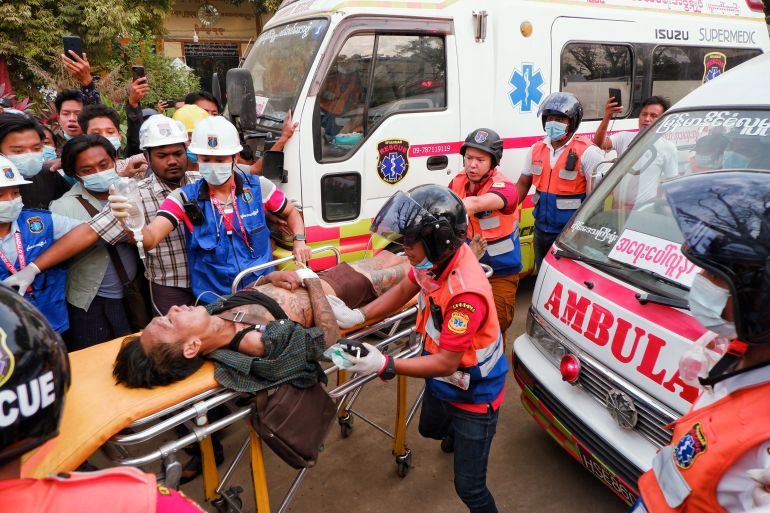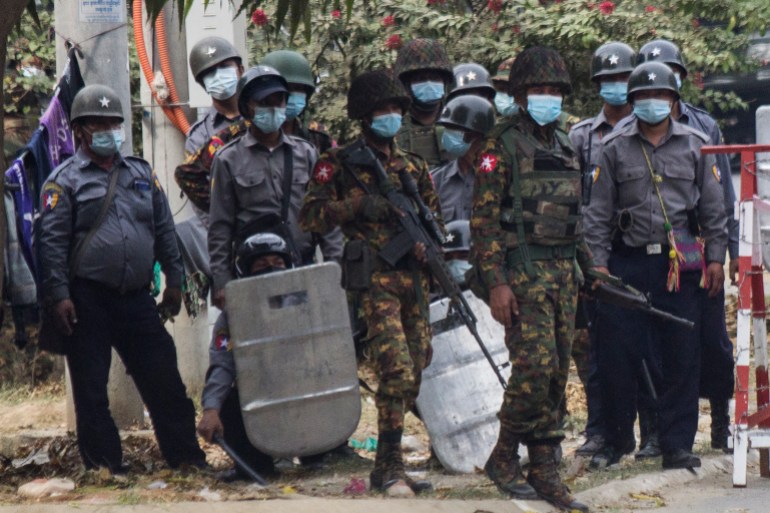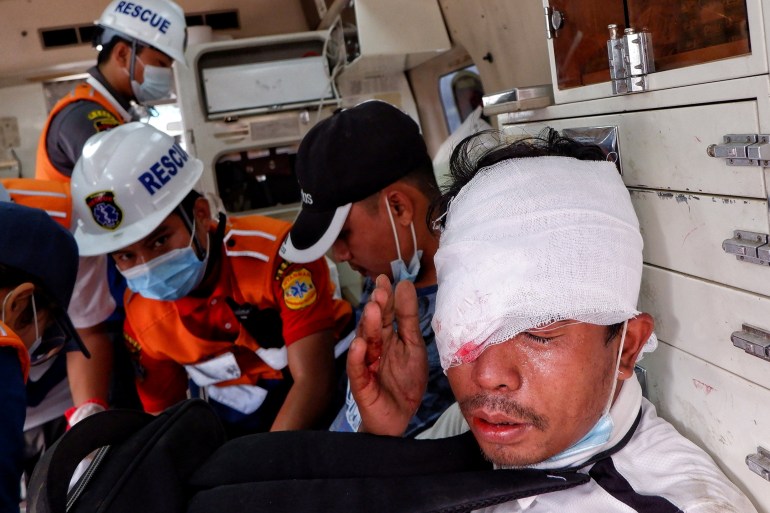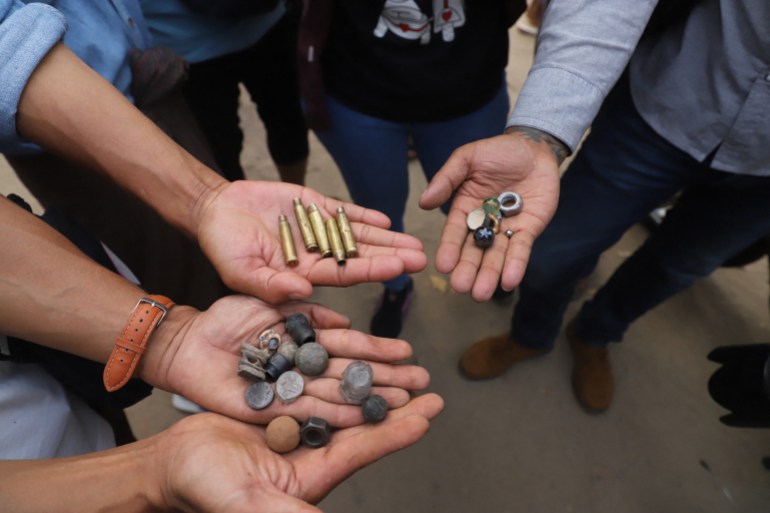Myanmar police kill 2 in bloodiest day of anti-coup protests
Security forces crack down on anti-coup demonstrators in Mandalay, prompting condemnation by the EU which calls meeting to discuss response.

At least two people have been killed and several wounded in Myanmar’s second city of Mandalay when security forces opened fire to disperse people protesting against the country’s military coup, according to emergency service workers and other witnesses.
The deaths on Saturday marked the bloodiest day in more than two weeks of large demonstrations against the February 1 military takeover, which deposed civilian leader Aung San Suu Kyi. The military authorities have responded with increasing force to the protests, deploying troops against peaceful rallies and firing tear gas, water cannon and rubber bullets, with isolated incidents of live rounds being used.
Keep reading
list of 3 itemsMyanmar’s minorities join protest as anger over death simmers
Raids and internet blackouts: Myanmar’s military vs protesters
In Mandalay, a shipyard raid turned violent on Saturday when security forces opened fire on demonstrators trying to stop the arrest of workers taking part in the growing anti-coup movement. The clash started with the demonstrators flinging rocks, but authorities retaliated by opening fire, sending them fleeing in fear.
“Two people were killed,” said Hlaing Min Oo, the chief of a Mandalay-based volunteer emergency rescue team, adding that one of the victims, who was shot in the head, was a teenager.
The death toll was confirmed by another emergency worker on the scene, who declined to be named for fear of repercussions. “One under-18 boy got shot in his head,” the worker told AFP news agency.


In addition to the deaths, which were also reported by local media, Ko Aung, leader of the Parahita Darhi volunteer emergency service agency, told Reuters news agency 20 people were wounded. At least five people were injured by rubber bullets and had to be carried away in ambulances, according to an Associated Press news agency journalist who witnessed the violence.
Local media reported more than a dozen people were arrested after the clash.
“They beat and shot my husband and others,” a resident told AFP in tears. “He was standing on the side and watching the protest but the soldiers took him away.”
I strongly condemn the violence against peaceful civilian protestors by the military. I urge the military and all security forces in #Myanmar to immediately stop violence against civilians.
We will discuss on Monday #FAC the latest events in Myanmar to take appropriate decisions— Josep Borrell Fontelles (@JosepBorrellF) February 20, 2021
Later on Saturday, the European Union’s foreign policy chief condemned the violence and said the bloc will “take appropriate decisions”.
“I strongly condemn the violence against peaceful civilian protestors by the military. I urge the military and all security forces in Myanmar to immediately stop violence against civilians,” Josep Borrell, the EU’s high representative and vice president, tweeted.
He said a meeting in Brussels of EU foreign ministers on Monday “will discuss … the latest events in Myanmar to take appropriate decisions”.
Reports said the upcoming meeting was expected to move towards sanctioning Myanmar military officers. Several countries, including the United States and United Kingdom, have already announced such measures.
UK Foreign Minister Dominic Raab said his country will consider further action against those involved in violence against people protesting Myanmar’s coup.
“The shooting of peaceful protesters in Myanmar is beyond the pale. We will consider further action, with our international partners, against those crushing democracy & choking dissent,” Raab said in a tweet.

Tribute to first protester killed
Also on Saturday, protesters in Myanmar’s two largest cities paid tribute to a young woman who died a day earlier after being shot by police during a rally against the coup.
An impromptu memorial created under an elevated roadway in the largest city of Yangon attracted about 1,000 protesters. A wreath of bright yellow flowers was hung beneath a photograph of Mya Thwet Thwet Khine, who was shot in the capital, Naypyidaw, on February 9, two days before her 20th birthday.
Her death on Friday, announced by her family, was the first confirmed fatality among tens of thousands of protesters who have faced off against security forces since top military commander Min Aung Hlaing took power in the coup.
Protesters at the memorial chanted and held up signs that read “End the dictatorship in Myanmar” and “You will be remembered Mya Thwet Thwet Khine”. The supporters also laid roses and rose petals on images of the woman.
Video from the day she was shot shows her sheltering from water cannon and suddenly dropping to the ground after a bullet penetrated the motorcycle helmet she was wearing. She had been on life support in hospital for more than a week with what doctors said was no chance of recovery.
In Mandalay on Saturday, a protest led by medical university students drew more than 1,000 people, many of whom also carried flowers and images of Mya Thwet Thwet Khine.
Others held signs saying “CDM,” referring to the nationwide civil disobedience movement that has encouraged doctors, engineers and others to protest against the coup by refusing to work.
‘Fight until the end’
The nationwide protests show no signs of slowing down despite recent crackdowns by the military government – including a sixth consecutive night in which the internet was cut for many hours.
Demonstrators also gathered elsewhere in Yangon, chanting and holding placards and images of Nobel laureate Aung San Suu Kyi, who has been detained since her democratically elected government was overthrown.
“There are possibilities of many more people dying,” said protester Khin Maw Maw Oo.
“We ourselves can’t even know whether we will die or not but we need to fight until the end regardless of our lives in order to succeed, and that is only after we get rid of this military dictatorship.”
Aerial images taken on Friday showed streets in Yangon painted with the words “The military dictatorship must fall” in Burmese, and “We want democracy” and “Free our leaders” in English.
Security forces have been relatively restrained so far in confronting protesters in Yangon, but appeared to be toughening their stance in areas where there is less media presence.
The military seized power after detaining Aung San Suu Kyi and preventing parliament from convening, saying elections in November were tainted by voting irregularities.
The election outcome, in which Aung San Suu Kyi’s National League for Democracy (NLD) party won by a landslide, was affirmed by an election commission that has since been replaced by the military.
The military government says it will hold new elections in a year’s time and hand power to the winner, but opponents of the coup are sceptical of the promise.
The coup was a notable setback to Myanmar’s transition to democracy after almost 50 years of army rule. Aung San Suu Kyi came to power after the NLD won a 2015 election, but the generals retained substantial power under the constitution, which was adopted under a military government.